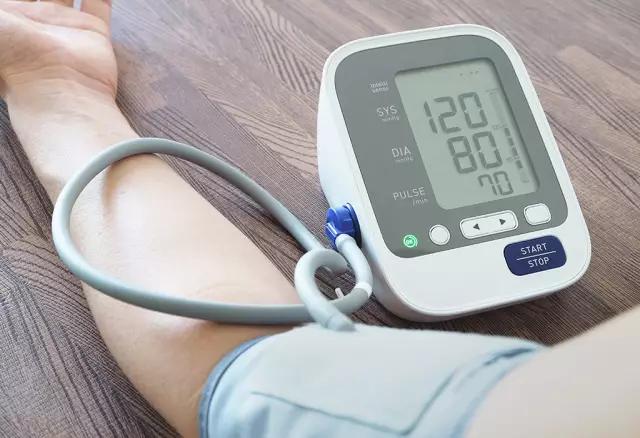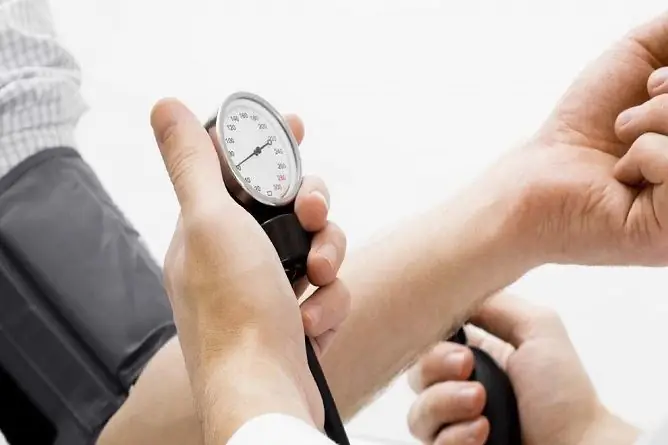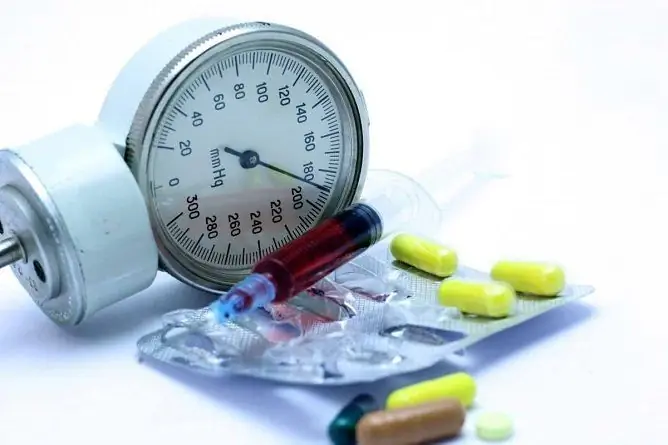- Author Rachel Wainwright wainwright@abchealthonline.com.
- Public 2023-12-15 07:39.
- Last modified 2025-11-02 20:14.
Low blood pressure during pregnancy: pregnant women have no reason to panic
The content of the article:
- What pressure is considered low
- Why does the pressure drop
- Low blood pressure symptoms
- What is the danger of hypotension in pregnant women?
- Correction of hypotension
- Video
Low blood pressure in pregnant women is noted often and at different times. Is this condition dangerous? Let's figure it out.

Low blood pressure during pregnancy is often a variant of the physiological norm.
During pregnancy, a woman needs to closely monitor her health and the health of her baby, respond to any changes in the body. This requires awareness of the pathological conditions that can occur in women during pregnancy. Low blood pressure in pregnant women is alarming, although in most cases it is not a serious threat. With timely correction, following the advice of a specialist, low blood pressure can be easily normalized even at home, without resorting to pharmacological drugs. Rarely, but it happens that excessively low blood pressure (hypotension) cannot be normalized for a long time. In this case, we are usually talking about a disease. Persistent and prolonged hypotension can threaten with circulatory disorders, which is harmful both for the pregnant woman herself and for the fetus.
What pressure is considered low
All people are advised to measure their blood pressure regularly, and not only during the period of manifestation of malaise due to the fact that it has increased or decreased to uncomfortable values. This is necessary in order to know your individual norm and to react quickly if the pressure is outside the normal range. For pregnant women, this is especially important, since the average pressure readings taken as normal may not correspond to the real state of affairs, and the state of health does not always correctly reflect the state of the cardiovascular system.
What is normal blood pressure? The norm is in the range of 110-140 mm Hg. Art. for the upper indicator, and 60-90 mm Hg. Art. for the bottom. Thus, for one person, the norm may be 110/60 mm Hg. Art., and for another it will be considered excessively low pressure. Can the pressure be 120/60 reduced? Maybe if the individual rate is, for example, 130/80, although those and other figures seem to correspond to normal indicators. This is why it is so important to know your norm.
A large number, upper, or systolic pressure characterizes the force of cardiac output and may indirectly indicate cardiac pathology. The second figure, lower, diastolic pressure reflects the resistance of peripheral vessels, and also depends on the functional state of the kidneys.
Why does the pressure drop
The main reason for lowering blood pressure in pregnant women is a change in hormonal levels. The female sex hormones estrogens have a pressure-lowering effect, which occurs in most women before menopause, when hormone production decreases - which is why women usually suffer from high blood pressure already in old age. During pregnancy, these hormones are produced much more than usual, which is the reason for the decrease in pressure. This state also has a physiological function - under conditions of hypotension, the proliferation and growth of new vessels is easier and more harmonious.
But not always low pressure means a variant of the norm. Persistent and significant hypotension can be a harbinger of endocrine dysfunction, exhaustion, allergic reaction, vascular collapse, chronic inflammation and other pathologies that should be excluded for your own peace of mind and safety. Therefore, it is necessary to consult a doctor who supervises pregnancy about low blood pressure.
Low blood pressure symptoms
The first signs of hypotension are usually subtle, it is drowsiness and weakness, which may be present in pregnant women and in the norm. The arbitration method in this case is the usual regular measurement of pressure.

The main symptoms of low blood pressure are weakness, drowsiness, headache
Typical clinical signs of hypotension in women during pregnancy are:
- Intense dizziness, aching headaches. The head hurts diffusely, over the entire surface.
- Distinct pulsation - high pulse - in the temples, occipital part of the head, as well as strong tremors in classical places of palpation, for example, on the hand.
- Nausea. In the early stages, this is normal, but if the pressure is lowered, nausea is not accompanied by vomiting, only a decrease in performance and rapid fatigue.
- Darkening in the eyes when changing position.
- Noise in ears.
- Meteorological dependence in women who were not previously sensitive to changes in atmospheric pressure or weather changes. In previously meteorological symptoms, the symptoms are exacerbated.
- Cardiac symptoms - a feeling of strong tremors of the heart, arrhythmia (unequal pauses between beats), too long pauses. With hypotension, the heart beats strongly, trying to compensate for the decrease in vascular resistance.
Sometimes nonspecific symptoms occur, such as pain or discomfort in the abdomen, muscle weakness, nosebleeds, and shortness of breath.
What is the danger of hypotension in pregnant women?
In the 1st trimester of pregnancy, low blood pressure occurs physiologically and can increase against the background of toxicosis. This is a conditionally normal condition during this period, but it requires careful monitoring and correction if necessary, since low pressure means weaker blood flow, which can cause fetal circulation to suffer. Long periods of low blood pressure can lead to fetal hypoxia. Fortunately, the fetus has the necessary compensation mechanisms that are rarely exhausted, in particular, fetal hemoglobin with high binding capacity. A real danger is secondary hypotension arising against the background of existing diseases. Also, prolonged hypotension affects the risk of miscarriage, increasing it.
In the 2nd trimester of pregnancy, low blood pressure is usually associated with an enlarged fetus. During sleep on the back, the mass of the fetus, placenta and amniotic fluid compresses deep veins, which is why hypotension occurs. The second trimester means greater autonomy of the child in the womb, his greater resistance to threatening factors. However, prolonged hypoxia with hypotension can still be threatening if the necessary measures are not taken.
The third trimester marks the imminent onset of labor, and the potential danger of low blood pressure is associated with this. If blood pressure is lowered for a long time in the third trimester, the ability of the uterus to contract may deteriorate due to a decrease in overall muscle tone. Weak labor is dangerous with complications such as bleeding, soft tissue ruptures, etc.
Correction of hypotension
What to do in case of low blood pressure during pregnancy? First of all, you should refrain from taking medications without a sufficient reason. There is no need to rush to increase the pressure, because it is not so much its sharp decrease (it is compensated) that is dangerous, but the prolonged effect of hypotension on the mother's body and on the child (in this case, the compensatory mechanisms are depleted). A woman has enough time to measure pressure in dynamics, that is, over several days, to consult a doctor and take medications if the doctor considers it necessary.

Prolonged low blood pressure can cause fetal hypoxia, and therefore requires medical supervision
What can you eat during periods of hypotension? Eat foods that affect blood pressure with caution. If in doubt, it is better to consult a doctor before using them, and perhaps the doctor will recommend them for correction. Black or green sweet tea, dark chocolate, coffee (preferably with milk), or a drink made from chicory can help increase low blood pressure.
Salty food is known to increase blood pressure, but pregnant women can eat it in very limited quantities, since edema can be provoked. It is enough to balance the diet, focusing on healthy food - easily digestible meats, fish, vegetables, fruits, fermented milk and dairy products.
You should drink more water - it increases the volume of circulating blood and, accordingly, pressure. If there are no medical contraindications, adaptogens can be used - eleutherococcus, ginseng, ginger, pantocrine.
Sometimes the pressure drops alarmingly, from which pharmaceutical drugs help, which should be taken by pregnant women only under the supervision of medical personnel - Caffeine, Mezaton, in rare cases, adrenergic drugs.
Video
We offer for viewing a video on the topic of the article.

Nikita Gaidukov About the author
Education: 4th year student of the Faculty of Medicine No. 1, specializing in General Medicine, Vinnitsa National Medical University. N. I. Pirogov.
Work experience: Nurse of the cardiology department of the Tyachiv Regional Hospital No. 1, geneticist / molecular biologist in the Polymerase Chain Reaction Laboratory at VNMU named after N. I. Pirogov.
Found a mistake in the text? Select it and press Ctrl + Enter.






